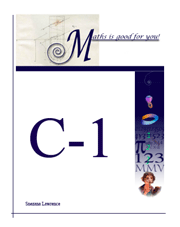
How surds work...
home | courses | topics | theorems | starters | worksheets | timeline | KS3 | KS4 | KS5
Sets of numbers
Real numbers (
![]() ) are all numbers that correspond to some number on a number line (whether whole – integers, or decimal numbers, positive or negative).
) are all numbers that correspond to some number on a number line (whether whole – integers, or decimal numbers, positive or negative).
The set of real numbers can be separated into two subsets: rational (
![]() ) and irrational (no sign for them) numbers. All rational numbers can be expressed as fractions of two integers, whereas the irrational numbers cannot.
) and irrational (no sign for them) numbers. All rational numbers can be expressed as fractions of two integers, whereas the irrational numbers cannot.
Natural numbers are positive counting numbers (1, 2, 3, etc.). They are denoted
![]() . Integers are whole numbers, whether positive or negative, denoted
. Integers are whole numbers, whether positive or negative, denoted
![]() (and there are two subsets to this – positive integers,
(and there are two subsets to this – positive integers,
![]() , and negative,
, and negative,
![]() ).
).
Roots that cannot be expressed as rational numbers are called SURDS. Surds are expressions containing an irrational number – they cannot be expressed as fractions of two integers. Examples are
![]() . When asked to give an exact answer, leave the square roots in your answer (although you may have to manipulate and/or rationalise the denominator) as you can never give an exact value of an irrational number.
. When asked to give an exact answer, leave the square roots in your answer (although you may have to manipulate and/or rationalise the denominator) as you can never give an exact value of an irrational number.
Rationalising The Denominator
For historical reasons, you need to somehow always 'get rid' of the surd if it is in the denominator.This is because, before the calculators, people used to have tables of values like logarithmic tables, which were calculated by someone and put in a book. So people looked up the books rather than make long calculations - this served two purposes: saving time, and trying to be as accurate as possible. These books with tables however, did and could not have all the possibilities - so for example, for surds they had the basic values, but not all combinations of these as that would be impossible to predict when writing a book.
There are several techniques of manipulation you can use to rationalise the denominator. When multiplying or dividing with surds, this may be helpful

When you get the expression which does not only have a surd in the denominator, but something like this:
![]()
you need to think how to get the surd in the numerator and have denominator without any surds. So you may want to apply the difference of squares:
![]()
This can also be applied to the case when one, or both, of the members of the brackets are square roots (or surds):
![]()
So
![]()
Laws on Indices
To be good with surds, you also need to know all rules for indices:

Common mistake
Never, ever split the sum or difference of an expression like
![]() into
into
![]() . You can't do that because you have two different numbers in an expression which is of the form
. You can't do that because you have two different numbers in an expression which is of the form
![]() . And as with any other powers of expressions within the brackets you can't just apply the powers to the members of the brackets, but you must imagine these bracketed expressions multiplying each other as many times as the power says.
. And as with any other powers of expressions within the brackets you can't just apply the powers to the members of the brackets, but you must imagine these bracketed expressions multiplying each other as many times as the power says.
What you CAN do is break a number or a product under a root into its factors, some of which will hopefully be numbers that you will be able to take outside of the root. For example,
![]()
or
![]()
Learn more about the history of surds here; you can download the revision guide for the whole C1 (Pure Mathematics 1) module here (English syllabus). Click on the picture below.
Or the other famous numbers.
Numbers topics are listed here
artefacts | numerals | concepts | people | places | pythagoreans | egyptians | babylonians
_____________________________________________________________________________________________________________________
Acknowledgements | Copyright | Contact | Mission Statement | Tell a friend about this site

